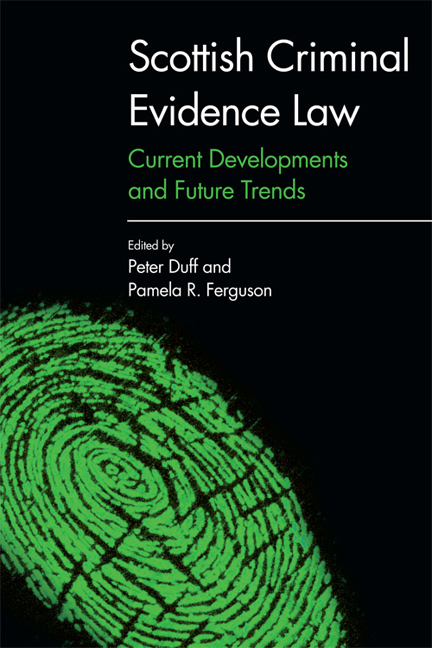Book contents
- Frontmatter
- Contents
- The Contributors
- Acknowledgements
- Table of Cases
- Table of Legislation
- Introduction
- 1 Cadder and Beyond: Suspects’ Rights and the Public Interest
- 2 ‘Access to Justice’ for Complainers? The Pitfalls of the Scottish Government’s Case to Abolish Corroboration
- 3 The Relevance of Sexual History and Vulnerability in the Prosecution of Sexual Offences
- 4 ‘Similar Fact’ Evidence and Moorov: Time For Rationalisation?
- 5 Hearsay in Scots law: Rethinking and Reforming
- 6 Eyewitness Identification Evidence and its Problems: Recommendations for Change
- 7 Assessing Witness Credibility and reliability: Engaging Experts and Disengaging Gage?
- 8 The process of Criminal Evidence Law Reform in Scotland: what Can We Learn?
- 9 Scottish Criminal Evidence Law Adrift?
- Bibliography
- Index
Introduction
Published online by Cambridge University Press: 24 April 2021
- Frontmatter
- Contents
- The Contributors
- Acknowledgements
- Table of Cases
- Table of Legislation
- Introduction
- 1 Cadder and Beyond: Suspects’ Rights and the Public Interest
- 2 ‘Access to Justice’ for Complainers? The Pitfalls of the Scottish Government’s Case to Abolish Corroboration
- 3 The Relevance of Sexual History and Vulnerability in the Prosecution of Sexual Offences
- 4 ‘Similar Fact’ Evidence and Moorov: Time For Rationalisation?
- 5 Hearsay in Scots law: Rethinking and Reforming
- 6 Eyewitness Identification Evidence and its Problems: Recommendations for Change
- 7 Assessing Witness Credibility and reliability: Engaging Experts and Disengaging Gage?
- 8 The process of Criminal Evidence Law Reform in Scotland: what Can We Learn?
- 9 Scottish Criminal Evidence Law Adrift?
- Bibliography
- Index
Summary
The law of Scottish criminal evidence is changing rapidly. That much is incontestable. But what is driving this process and where is the destination? These are the two questions with which this collection is concerned. As the penultimate chapter by Chalmers, Leverick and Stark and the final chapter by Duff explain, the pace of change began accelerating around twenty years ago. The advent of the Scottish Parliament has undoubtedly contributed to the volume of legislation on criminal evidence, nonetheless, it is clear that there is no single overall reason explaining the rapid pace of change, far less any strategy put in place by the Scottish Government, the legal establishment, the Scottish Law Commission or any such collective mind. Thus, what is happening is not a logical ‘evolution’, pursued as part of any coherent framework, nor a ‘revolution’ being driven by a particular ideological approach. As this collection will show, a series of individual reforms has taken place in respect of a variety of evidentiary doctrines, practices and rules. These have occurred largely as a result of ‘events’, primarily political pressure brought to bear by interest groups and high-profile cases leading to public concern, although some reforms have taken place in a more deliberate way as a result of a gradually perceived need by the legal establishment to update a particular aspect of Scottish criminal evidentiary law. The following essays will analyse the significant changes to the recent law in various areas, explain why they came about and attempt to set each reform in the broader context of the law of criminal evidence and procedure as a whole. More ambitiously, there will be some attempt to identify the future trajectory – or, perhaps, trajectories – of change, although, as Duff argues in the final chapter, it is impossible to forecast precisely what the Scottish law of criminal evidence might look like twenty years hence.
In the opening two substantive chapters, the authors analyse the major ramifications of Cadder v HMA. This decision on a human rights point by the Supreme Court in 2011 has probably had more impact on the law of Scottish criminal evidence than any other event in the past twenty years.
- Type
- Chapter
- Information
- Scottish Criminal Evidence LawCurrent Developments and Future Trends, pp. 1 - 17Publisher: Edinburgh University PressPrint publication year: 2017



